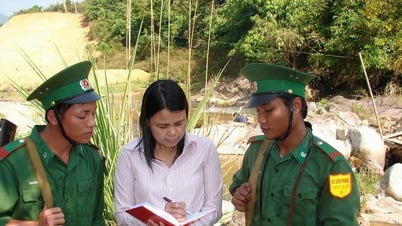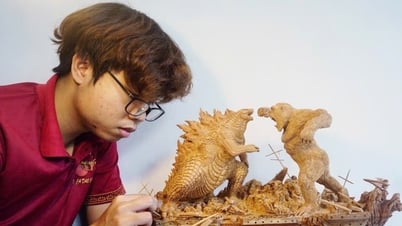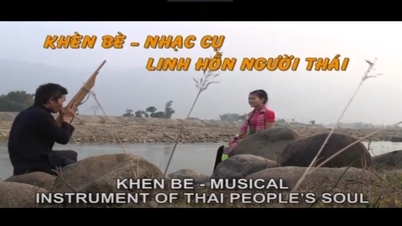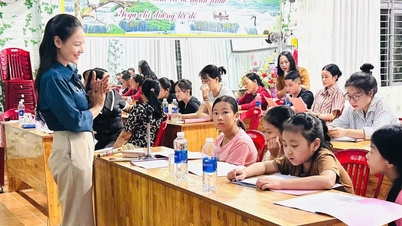(VHQN) - In the South Central region, there are many nursery rhymes that are passed down orally. Through many years of research and collection, we have recorded and sketched a number of nursery rhymes in the form of pitch and duration, mainly following the rhythm of the game.

Although the lyrics have rhymes, children pay attention to the game. The lyrics in a nursery rhyme are often just a habit, the rhythm is suitable for the game, when playing children do not pay attention to the singing voice, sometimes they are so happy that they scream, sometimes they sing like they are talking, sing like they are reading, and do not even understand the content of the nursery rhyme.
Children in Vietnam have many nursery rhyme games with songs. Children in the North have: nu na nu nong, dung dang dung de, drop leeches and turtles, hopscotch, capture the flag, capture the cu, scissors and saws, weaving, card passing...
Southern children have: "cumm num cum niu", "bac kim thang", "spoons la" and "spoons lay", "lac co co", "cat chases mouse", "tao leaf cover", "banh xo", "chicken pecks termites", "mother goat finds kid", "chum rum"...
In the South Central provinces, there are: sandal passing, rainbow flipping, pounding pestle, casting jars and jars, "u a u ap", tapping bamboo sticks, calling calves, popping seeds, casting coconut trees, casting cotton trees, sparrows, "u tu", children's rhymes, greeting the snake, raising a ladder...
We would like to introduce to our readers some examples of how to play.
Passing sandals
The game was recorded by the author at the Temple of Confucius (Hoi An, May 1977). Lyrics of the nursery rhyme: "Let's pass the sandal, let's pass it evenly, pass it quickly, pass it skillfully, if not, if not, then please go out"...
The way to play is a group of children squat in a circle, each holding a slipper in their hand, singing along to the beat while passing the slipper to each other in one direction.
At the phrase “if not, if not”, the slipper is passed back and forth twice, whoever cannot catch the slipper is eliminated. The game continues like this until the last person. The game is lively and fun, the winner is the last person left (not out).
Swipe the explosive seeds
This is a popular game for children from 6 to 10 years old. The game is gentle and graceful with hands in pairs, clapping each other, then clapping your own hands, expressing the sincerity, naturalness, and purity of friendship, enthusiastically reading with intonation or singing a nursery rhyme. The space is not complicated, it can be a corner of the yard, outside the alley, an empty land, or a communal house yard under the moonlight.
In 2000, folklore researcher Tran Hong ( Da Nang ) and the author of this article collaborated with VTV in Da Nang to produce the film Sing Together - Play Together (introducing the game Swipe Explosive Seeds), which was broadcast many times on VTV3.
Two children stand facing each other. Clasp hands together in front of chest, sing and clap your hands together once, then clap one hand crosswise to your partner's hand (ie your left hand to your partner's left hand, your right hand to your partner's right hand).
Opening: Clap singing - two hands slap each other. Next singing: Popping seed - raise your right hand and hit your friend's right hand. Next singing: Do - two hands slap each other. Next singing: Banh beo - raise your left hand and hit your friend's left hand. And so on until the song is sung together.
You can continue playing with other nursery rhymes: “Round pot with crooked lid. Tailor’s scissors. Plow for farming. Flute for diking the bank. Fish trap. Slingshot for shooting birds. Needle for sewing clothes. Spear for hunting. Head scarf. Mug for trading. Cake mold. Wine pitcher.” The hand clapping gets faster and faster. Whoever can’t keep up or claps with the wrong hand loses. The hand clapping must match the lyrics.
Buzz!
The number of players is from 6 to 8 children. Take a standard pole, called “Cot dong”. One child acts as “the one” by holding his hand out for the other children to put their index fingers on (not allowed to pull it up or down).

Children act as “the” and sing the whole rhyme, until the word “ap” they close their hands. Whoever cannot pull their hands back in time must blindfold their friends and let them hide. When their friends hide, the children open their eyes and go find their friends, singing the song while searching.
The hiding children must run back to the goal post quickly, not letting the seeking children catch them. Once they reach the goal post, they must hug the goal post and say “Bang”. If the seeking children do not catch anyone, they must continue to close their eyes and play again.
Walk slowly
Lyrics of the nursery rhyme: “Dung dang dung de. Take the children out to play. To the gate of heaven. Pray to uncle and aunt. Let the child go home. Let the goat go to school. Let the toad stay home. Let the chicken scratch in the kitchen. Cook sticky rice. My family cooks sweet soup. Slurp slurp slurp. Sit down here.”
The way to play is for children to hold hands in pairs or in rows of 4-5 children, walking and singing. When singing or reading the word “dung”, swing your arms forward, when reading the word “dang”, swing your arms back, continue like that until the last sentence, then squat down. Then stand up, sing again from the beginning and continue playing.
Chi chi chan chan
Need a large space, with places for children to hide. Many children play together. To choose a child, blindfold them and find the hiding children. An older child gathers the children who like to play, stands in a circle, holds up his right hand, and lets each child put the index finger of his right hand in the palm of this hand, and he puts it on the index finger of his left hand.
The leader of the group chants the song: “Chi chi chan chan. The fire-blowing bird. The horse is swollen. The three kings and five emperors. The judge goes to find it. Buzz... boom... boom.” When reaching the last "boom" line, the student can prolong the interval between the sounds as long or short as desired, to surprise the other students when they reach the "boom" sound. Because when chanting the last "boom" sound of the song, the student immediately clasps his right hand and the students must quickly withdraw their fingers.
The child whose finger is grabbed by the leader’s hand must be blindfolded and search for it. If they don’t grab anyone, they have to start over. This game usually takes place in a house so that everyone can agree on the area where they will hide.
Source



![[Photo] Ho Chi Minh City is brilliant with flags and flowers on the eve of the 1st Party Congress, term 2025-2030](https://vphoto.vietnam.vn/thumb/1200x675/vietnam/resource/IMAGE/2025/10/10/1760102923219_ndo_br_thiet-ke-chua-co-ten-43-png.webp)
![[Photo] General Secretary attends the parade to celebrate the 80th anniversary of the founding of the Korean Workers' Party](https://vphoto.vietnam.vn/thumb/1200x675/vietnam/resource/IMAGE/2025/10/11/1760150039564_vna-potal-tong-bi-thu-du-le-duyet-binh-ky-niem-80-nam-thanh-lap-dang-lao-dong-trieu-tien-8331994-jpg.webp)


![[Photo] Opening of the World Cultural Festival in Hanoi](https://vphoto.vietnam.vn/thumb/1200x675/vietnam/resource/IMAGE/2025/10/10/1760113426728_ndo_br_lehoi-khaimac-jpg.webp)

















![[Photo] Unique Phu Gia horse hat weaving craft](https://vphoto.vietnam.vn/thumb/1200x675/vietnam/resource/IMAGE/2025/10/10/1760084018320_ndo_br_01-jpg.webp)








































































Comment (0)